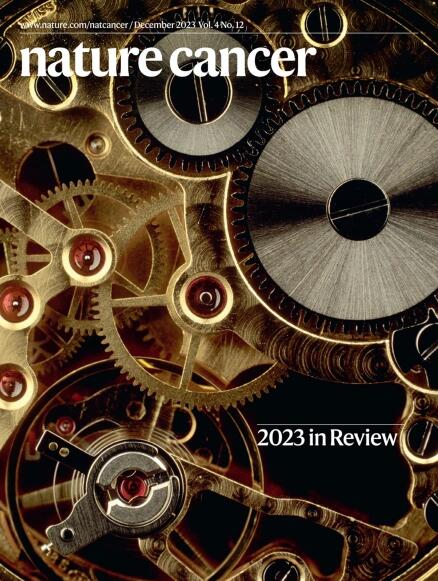年龄相关的烟酰胺腺嘌呤二核苷酸下降驱动CAR-T细胞衰竭。
IF 28.5
1区 医学
Q1 ONCOLOGY
引用次数: 0
摘要
嵌合抗原受体(CAR) T细胞疗法是最有前途的癌症治疗方法之一。然而,不同的障碍限制了它的应用和功效。在这种情况下,衰老如何影响CAR-T细胞的结果在很大程度上是未知的。本研究表明,老年雌性小鼠产生的CAR-T细胞存在由烟酰胺腺嘌呤二核苷酸(NAD)耗竭引起的线粒体功能障碍,导致体内干细胞样特性差和功能受限。此外,人类数据分析显示,年龄和NAD代谢决定了对CAR-T细胞治疗的反应性。针对NAD通路,我们能够恢复来自老年人的CAR-T细胞的线粒体适应性和功能。总之,我们的研究表明,衰老是成功的CAR-T细胞反应的限制因素。修复由年龄引起的代谢和功能障碍,如NAD下降,是改善当前和未来CAR-T细胞治疗的一种有希望的策略。本文章由计算机程序翻译,如有差异,请以英文原文为准。

Age-associated nicotinamide adenine dinucleotide decline drives CAR-T cell failure
Chimeric antigen receptor (CAR) T cell therapy is one of the most promising cancer treatments. However, different hurdles are limiting its application and efficacy. In this context, how aging influences CAR-T cell outcomes is largely unknown. Here we show that CAR-T cells generated from aged female mice present a mitochondrial dysfunction derived from nicotinamide adenine dinucleotide (NAD) depletion that leads to poor stem-like properties and limited functionality in vivo. Moreover, human data analysis revealed that both age and NAD metabolism determine the responsiveness to CAR-T cell therapy. Targeting NAD pathways, we were able to recover the mitochondrial fitness and functionality of CAR-T cells derived from older adults. Altogether, our study demonstrates that aging is a limiting factor to successful CAR-T cell responses. Repairing metabolic and functional obstacles derived from age, such as NAD decline, is a promising strategy to improve current and future CAR-T cell therapies. Vannini and colleagues report that an age-associated decline in nicotinamide adenine dinucleotide levels is associated with mitochondrial dysfunction and reduced antitumor efficacy of chimeric antigen receptor T cells derived from older adults.
求助全文
通过发布文献求助,成功后即可免费获取论文全文。
去求助
来源期刊

Nature cancer
Medicine-Oncology
CiteScore
31.10
自引率
1.80%
发文量
129
期刊介绍:
Cancer is a devastating disease responsible for millions of deaths worldwide. However, many of these deaths could be prevented with improved prevention and treatment strategies. To achieve this, it is crucial to focus on accurate diagnosis, effective treatment methods, and understanding the socioeconomic factors that influence cancer rates.
Nature Cancer aims to serve as a unique platform for sharing the latest advancements in cancer research across various scientific fields, encompassing life sciences, physical sciences, applied sciences, and social sciences. The journal is particularly interested in fundamental research that enhances our understanding of tumor development and progression, as well as research that translates this knowledge into clinical applications through innovative diagnostic and therapeutic approaches. Additionally, Nature Cancer welcomes clinical studies that inform cancer diagnosis, treatment, and prevention, along with contributions exploring the societal impact of cancer on a global scale.
In addition to publishing original research, Nature Cancer will feature Comments, Reviews, News & Views, Features, and Correspondence that hold significant value for the diverse field of cancer research.
 求助内容:
求助内容: 应助结果提醒方式:
应助结果提醒方式:


